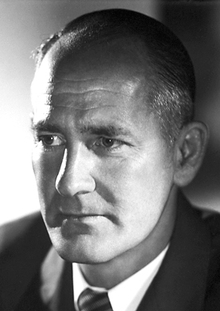George Beadle
George Wells Beadle (October 22, 1903 – June 9, 1989) was an American geneticist who won the Nobel Prize in Physiology or Medicine in 1958 alongside Edward Tatum for their discovery that genes act by regulating definite chemical events. Beadle and Tatum's experiments with the bread mold Neurospora crassa led to a fundamental understanding of the genetic control of biochemical reactions in organisms, laying the groundwork for the field of molecular biology.
Early Life and Education[edit | edit source]
George Beadle was born in Wahoo, Nebraska, and grew up in a farm setting, which piqued his interest in agriculture and biology. He received his B.S. in Agriculture from the University of Nebraska in 1926 and went on to earn a Ph.D. in Genetics from Cornell University in 1931. During his time at Cornell, Beadle was influenced by geneticists such as Rollins Adams Emerson and Barbara McClintock, which shaped his future research direction.
Career and Research[edit | edit source]
After completing his Ph.D., Beadle took a position at the California Institute of Technology (Caltech), where he began his collaboration with Edward Tatum. Their pioneering work involved exposing the fungus Neurospora crassa to X-rays, causing mutations. They discovered that these mutations could lead to the absence of specific enzymes that were involved in metabolic pathways. This work was crucial in demonstrating that genes were responsible for the production of enzymes, supporting the one gene-one enzyme hypothesis. This hypothesis was later expanded to the one gene-one polypeptide theory, reflecting a deeper understanding of gene function.
Beadle's research had a profound impact on the field of genetics and molecular biology, influencing subsequent generations of scientists. After his groundbreaking work with Tatum, Beadle served as the President of the University of Chicago from 1961 to 1968, where he continued to advocate for scientific research and education.
Legacy[edit | edit source]
George Beadle's contributions to genetics and molecular biology were immense. He was awarded the Nobel Prize in Physiology or Medicine in 1958, an honor that recognized the significance of his work with Edward Tatum. Beyond his scientific achievements, Beadle's leadership at the University of Chicago left a lasting impact on the institution's direction in scientific research and education.
Beadle's work laid the foundation for the modern understanding of genetics and its role in life's biochemical processes. His research demonstrated the direct link between genes and enzymes, paving the way for the development of genetic engineering and biotechnology.
Personal Life[edit | edit source]
George Beadle was married to Muriel McClure, a microbiologist, with whom he shared a lifelong partnership in both his personal and professional life. They had one son, David Beadle.
Death and Honors[edit | edit source]
George Beadle passed away on June 9, 1989. His legacy is remembered through numerous awards and honors, including the Nobel Prize. He is also commemorated through the George W. Beadle Award of the Genetics Society of America, which recognizes outstanding contributions to the field of genetics.
Search WikiMD
Ad.Tired of being Overweight? Try W8MD's physician weight loss program.
Semaglutide (Ozempic / Wegovy and Tirzepatide (Mounjaro / Zepbound) available.
Advertise on WikiMD
|
WikiMD's Wellness Encyclopedia |
| Let Food Be Thy Medicine Medicine Thy Food - Hippocrates |
Translate this page: - East Asian
中文,
日本,
한국어,
South Asian
हिन्दी,
தமிழ்,
తెలుగు,
Urdu,
ಕನ್ನಡ,
Southeast Asian
Indonesian,
Vietnamese,
Thai,
မြန်မာဘာသာ,
বাংলা
European
español,
Deutsch,
français,
Greek,
português do Brasil,
polski,
română,
русский,
Nederlands,
norsk,
svenska,
suomi,
Italian
Middle Eastern & African
عربى,
Turkish,
Persian,
Hebrew,
Afrikaans,
isiZulu,
Kiswahili,
Other
Bulgarian,
Hungarian,
Czech,
Swedish,
മലയാളം,
मराठी,
ਪੰਜਾਬੀ,
ગુજરાતી,
Portuguese,
Ukrainian
Medical Disclaimer: WikiMD is not a substitute for professional medical advice. The information on WikiMD is provided as an information resource only, may be incorrect, outdated or misleading, and is not to be used or relied on for any diagnostic or treatment purposes. Please consult your health care provider before making any healthcare decisions or for guidance about a specific medical condition. WikiMD expressly disclaims responsibility, and shall have no liability, for any damages, loss, injury, or liability whatsoever suffered as a result of your reliance on the information contained in this site. By visiting this site you agree to the foregoing terms and conditions, which may from time to time be changed or supplemented by WikiMD. If you do not agree to the foregoing terms and conditions, you should not enter or use this site. See full disclaimer.
Credits:Most images are courtesy of Wikimedia commons, and templates, categories Wikipedia, licensed under CC BY SA or similar.
Contributors: Prab R. Tumpati, MD

